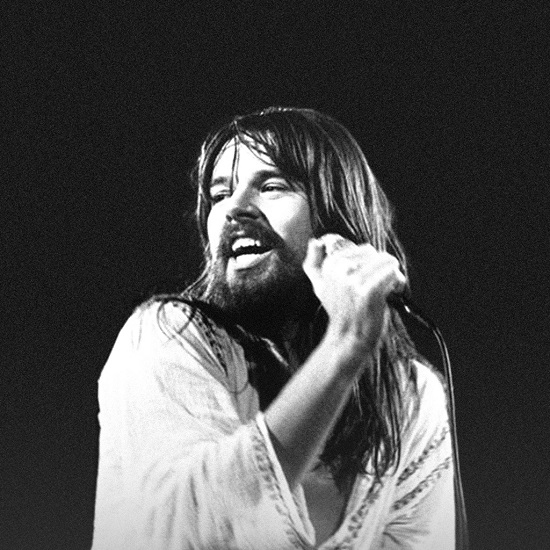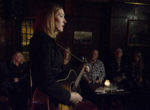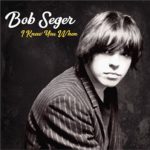
Here’s a strange coincidence that brings a bit of musical history solidly back into the present. I had almost finished this piece and was in the process of editing, stepping away from and tweaking when I felt the need to go and photograph some live musicians again. On most Sundays during the summer months, you can catch some solo performers and duos at Eccleston Yards near Victoria Station in London. The gigs are organised by Talentbanq, a company that promotes unsigned musicians, mainly in small venues and you can usually find its hands-on CEO Ray Jones there as compere and sound engineer. The first performer on stage was Erin Bowman, from New Jersey via California, playing a mixture of classic rock interpretations and original material. I was hooked from the start by her laid-back acoustic version of Tom Petty’s “American Girl”, but the last song in the set was the one that did it. In London, in 2021, Erin was doing her version of Bob Seger’s “Against the Wind”, originally released in 1980. Never underestimate the staying power of a great song.
If you’ve been seriously into music for over fifty years, then you’ve had an artist (or a few) that got away. The ones you were convinced would be massive but didn’t make it at all, or only in certain territories. One of mine was Bob Seger, with or without The Silver Bullet Band. I knew he deserved be a UK Top 20 artist, but it took about twenty years to prove me right (sort of).
It’s been a long journey, but where did it start? Nottingham’s commercial station Radio Trent in 1974, I guess. I heard “Get Out of Denver” blasting out of a tiny radio speaker and I was hooked. No doubts, no second thoughts, this was the mutt’s. Was it a Chuck Berry rehash? Of course it was, but Chuck could never have written those lyrics and his laconic drawl wouldn’t have allowed him to fire and spit them out the way Bob Seger did. This was “Tulane” on steroids and I was hooked, although it would take a couple of years before I was finally reeled in.
Bob Seger spent years grinding round the Midwestern circuit building up a massive and loyal live following before first troubling the US singles charts in 1967 and 1968 respectively with “Heavy Music” and “Ramblin’ Gamblin’ Man” which both went on to become huge live favourites. He was a classis seventies example of building up a live fanbase to help (eventually) sell records. During the period between ‘68 and ’75, his band went through personnel and name changes and moved from Capitol to Reprise and back again. Reprise had tried to break him through into the mainstream, even trying to break the UK, but they were only reaching musicians and the committed (“Get Out of Denver” was covered by Eddie and the Hot Rods and Dave Edmunds and “Rosalie” was covered by Thin Lizzy). So back to Capitol again.
What happened next was really interesting. The first Capitol album, “Beautiful Loser” was the blueprint for what was to come over the next ten years. It was a combination of up-tempo rockers (“Katmandu”) and slower, more nostalgic pieces (“Fine Memory” and “Momma”), the well-chosen cover (“Nutbush City Limits”) and the classic wistful mid-tempo pieces (“Beautiful Loser” and “Jody Girl”). Its peak chart position in the US was 131, but it went on to hit double platinum certification. It wasn’t perfect, but everyone involved knew that this was the template; more of the same would do very well indeed, but there was a way of building up a head of steam before the next studio album. The mid-70s was the era of the double live album; if you had a band that could reliably turn it on live and you put them in front of a friendly crowd you had an instant hit, so that’s what Capitol did.
“Live Bullet” was the clincher; a classic example of a live band at their peak. You got Bob Seger originals, including the classic-to-be “Turn the Page” (later covered by Metallica) and covers of “Nutbush City Limits” and “Let It Rock”. It went quintuple platinum in the US and now no-one was looking back. In the space of a year Bob Seger had arrived, at least in the US. It was always a mystery to me that no-one else in the UK seemed to get this but, with hindsight, it was just too American for the time. In 1975 Bob Seger stood a chance of being bracketed with the better bands breaking out from the pub rock scene, but was doomed in the UK after the insular and inward-looking punk explosion. It wasn’t stopping me; I grew up in a town where any sort of escape, to London or Detroit, was a good thing. And if I’m honest, the inner music snob in me likes to support an artist/band that no-one else has heard of.
As far as the North American continent (and later, Australia) were concerned, Bob Seger had made it. In the US alone, he sold over 30 million albums between 1975 and 1991, and that’s people who went to their local record shop and parted with cash for vinyl, cassette, eight track (remember that) and, towards the end, CD. The stars had aligned; the formula for the albums had been established with “Beautiful Loser”, the songwriting was perfectly honed, the production was superb (and don’t underestimate the importance of the backing vocalists from “Night Moves” onwards), Capitol was 100% behind the artist and The Silver Bullet Band was the perfect vehicle to go out and sell the songs to a live audience. Between 1975 and the peak, when “Against the Wind” hit Number One in the US album charts in 1980, Bob Seger could do no wrong in his home territory, Australia and big chunks of Europe, so why not the UK? Two obvious reasons.
The first one is about economics. Despite a reasonable amount of radio play, only the albums “Stranger in Town” and “Against the Wind” made any impact on the album charts and the singles did even worse. It was the wrong kind of music for the UK at that time despite being huge across the pond. It didn’t really make any economic sense for Capitol/EMI to invest huge amounts in touring the UK if it didn’t significantly add to record sales, and they were probably right. The Silver Bullet Band only played five gigs in Britain and I was at two of those; Glasgow Apollo (14/10/77) and Wembley Arena (21/11/1980). I’m slightly biased, but both were stunning gigs that were well-attended by wildly enthusiastic audiences and they were his first and last UK gigs. Unfortunately, you couldn’t break the UK market with five gigs. If you were counting the beans at Capitol/EMI, why would you invest any more in a territory like the UK when you could tour arenas in the USA and Canada promoting new albums and selling shedloads of merchandise. I understand that completely.
The second point is a bit more controversial, and more stalwart Bob Seger fans might want to stop reading now. I’m still a huge fan, but I couldn’t honestly say that there was one album that I wouldn’t want to skip an odd track on (with two exceptions, coming later). From 1975 onwards, Capitol/EMI were pitching Bob Seger at the traditional album market and they didn’t seem to see that the material wasn’t always even. “Night Moves”, “Stranger in Town” and “Against the Wind” had more than their fair share of classic songs, but they weren’t consistent or consistently excellent. You want reasons for that? Pressure to write brilliant new songs for albums every eighteen months while touring constantly, using the Silver Bullet Band for part of each album and The Muscle Shoals Rhythm Section for the other part, or maybe just burnout. The albums had to keep appearing regularly to satisfy the public, whether they were perfect or not. After “Against the Wind”, sales started to slow and gaps between albums increased as Seger’s family life became more important. And that should have meant the last chance for UK success, but you never know, do you?
In the summer of 1996, I was in the Pub on the Pond in Swansea having lunch with my mate Bekky when I heard a familiar voice from the CD jukebox (remember them?). It was Bob Seger and I had to go over and check it out, because it wasn’t a song I’d heard him play. It was a storming cover of the Chuck Berry classic “C’est la Vie”/”You Never Can Tell” and the album was “Greatest Hits”, released in the UK in 1994 which sort of proved my theory that Bob Seger had a huge number of classic songs but they weren’t all on the same album. It reached Number 6 in the UK and also spawned the first UK Top 40 single with “We’ve Got Tonite”. It probably helped that the songs were all FM radio-friendly and continued to be played on pockets of UK radio long after their initial release. There was a certain irony that Brits nostalgic for the 70s were buying into an album that was packed with nostalgia for 1950s/60s America. It’s a near-perfect album and the UK marketing worked like a dream.
There was another Seger album I would happily listen to all the way through, and it was intended to be the swansong. “Ride Out” was released in 2014 and it would have been a fitting famous final scene; it’s a classic album that I would recommend to anyone. Only it wasn’t the final album; as a response to the death of his long-time friend from Detroit, Glenn Frey in 2016, he released one final album, “I Knew You When” as a tribute, in 2017. That was the second encore and Bob Seger had finally left the building.
As a long-time fan, it was a validation that he finally achieved success in the UK even if it was a little late. If the run of albums starting with “Night Moves” had started a year earlier or five years later, things might have been very different, but it won’t keep him awake at night – he sold over 75 million records worldwide, wrote songs that were covered by almost everyone (there are over sixty covers of “We’ve Got Tonite”) and finished his career on his own terms. He wrote classic songs that we could all relate to and, if “Against the Wind” isn’t played at my funeral, will you all please deal with the people responsible. If you already know his work, you’ll probably understand why I’ve written this; if not, you could do a lot worse than check him out anyway. Rock and roll never forgets.
I’m not sure that the term ‘single’ means anything in music terms any more. Radio professionals talk about lead tracks from albums, but I’ve got to the point where I just call them great songs. Most of the albums I hear won’t actually have a physical single released from them; it’s twelve songs on iTunes or Spotify. So I’m not picking five favourite singles, I’m picking five favourite songs that I’ve heard for the first time this year, in no particular order.
 “Living on Lonely” – Hannah Aldridge – This song is from Hannah’s “Gold Rush” album, which was released this year. I’ve heard Hannah play the title song live over about eighteen months and I was convinced it would be my favourite song on the album (it’s a stunningly good song) but after hearing the album and hearing Hannah play the songs live this year, it’s “Living on Lonely” that has really made an impact. It’s a slow-paced piece dealing with the loneliness of life on the road and the inevitable temptations of that lifestyle. There’s some gorgeous low-register guitar running through the song and Hannah’s vocal is heart-rendingly melancholic. It’s just beautiful.
“Living on Lonely” – Hannah Aldridge – This song is from Hannah’s “Gold Rush” album, which was released this year. I’ve heard Hannah play the title song live over about eighteen months and I was convinced it would be my favourite song on the album (it’s a stunningly good song) but after hearing the album and hearing Hannah play the songs live this year, it’s “Living on Lonely” that has really made an impact. It’s a slow-paced piece dealing with the loneliness of life on the road and the inevitable temptations of that lifestyle. There’s some gorgeous low-register guitar running through the song and Hannah’s vocal is heart-rendingly melancholic. It’s just beautiful.
 “I Knew You When” – Bob Seger – When he released “Ride Out” in 2014, it had the feel of a farewell to the music business and there were plenty of rumours that it was Bob Seger’s swansong, and maybe it was, at that time; it would have been a great album to bow out on. Everything changed on January 18, 2016 with the death of his good friend from Detroit, Glenn Frey. It’s taken a while to process, but he’s used the pain and love for his old friend to form the back bone of another great late career album. He’s always been a master of the mid-tempo rock song evoking late fifties early sixties smalltown America and “I Knew You When” is a perfect example of the style with the added poignancy of a personal connection.
“I Knew You When” – Bob Seger – When he released “Ride Out” in 2014, it had the feel of a farewell to the music business and there were plenty of rumours that it was Bob Seger’s swansong, and maybe it was, at that time; it would have been a great album to bow out on. Everything changed on January 18, 2016 with the death of his good friend from Detroit, Glenn Frey. It’s taken a while to process, but he’s used the pain and love for his old friend to form the back bone of another great late career album. He’s always been a master of the mid-tempo rock song evoking late fifties early sixties smalltown America and “I Knew You When” is a perfect example of the style with the added poignancy of a personal connection.
 “1954” – Hannah Rose Platt – This is one of those that grabbed me instantly: first play. I know it’s four years old, but 2017 was when I heard it first, so it’s going in. I love Hannah’s songs; she has a gift for melody and knows how to tell a story. This is based on a story told to her by a housemate about a care home patient who dressed up every evening to wait for a date that never arrived. Hannah relocated the story from Liverpool to America, added just enough detail to make it feel real and created a heart-breaking little masterpiece. I heard her play it live last weekend and it was just perfect. She has an album coming out in 2018 and I’m certain we’ll be reviewing it here.
“1954” – Hannah Rose Platt – This is one of those that grabbed me instantly: first play. I know it’s four years old, but 2017 was when I heard it first, so it’s going in. I love Hannah’s songs; she has a gift for melody and knows how to tell a story. This is based on a story told to her by a housemate about a care home patient who dressed up every evening to wait for a date that never arrived. Hannah relocated the story from Liverpool to America, added just enough detail to make it feel real and created a heart-breaking little masterpiece. I heard her play it live last weekend and it was just perfect. She has an album coming out in 2018 and I’m certain we’ll be reviewing it here.
 “Your Balloon is Rising” – Stone Foundation featuring Paul Weller – I have so much admiration for these guys. They’ve done it the hard way without any help (until this year) from the music establishment. They’ve written, recorded, gigged and written, recorded, gigged until they built up a substantial fanbase in the UK, Europe and Japan then suddenly Paul Weller was producing their latest album “Street Rituals” at Black Barn as well as co-writing and making guest appearances. Here’s one of those guest appearances on a beautiful soul ballad that’s absolutely timeless. Weller’s voice works with the song, but even without him it sounds just fine with a Neil Jones vocal.
“Your Balloon is Rising” – Stone Foundation featuring Paul Weller – I have so much admiration for these guys. They’ve done it the hard way without any help (until this year) from the music establishment. They’ve written, recorded, gigged and written, recorded, gigged until they built up a substantial fanbase in the UK, Europe and Japan then suddenly Paul Weller was producing their latest album “Street Rituals” at Black Barn as well as co-writing and making guest appearances. Here’s one of those guest appearances on a beautiful soul ballad that’s absolutely timeless. Weller’s voice works with the song, but even without him it sounds just fine with a Neil Jones vocal.
 “Tennessee Night” – Ed Dupas – I’m rapidly becoming a big fan of Ed Dupas as a songwriter and a singer. He has a passion for his craft and combines rock and country sounds in a way that reminds me a little of Bob Seger (coincidentally). “Tennessee Night” is the title song from his 2017 album and is a perfect little vignette that evokes “Texasville”, the sequel to “The Last Picture Show”, where the small-town girl returns from the big bad city and there might be a happy ending, or there might not. The answer’s left hanging in the Tennessee night. It’s a classic piece of songwriting from an artist with a true passion for his craft.
“Tennessee Night” – Ed Dupas – I’m rapidly becoming a big fan of Ed Dupas as a songwriter and a singer. He has a passion for his craft and combines rock and country sounds in a way that reminds me a little of Bob Seger (coincidentally). “Tennessee Night” is the title song from his 2017 album and is a perfect little vignette that evokes “Texasville”, the sequel to “The Last Picture Show”, where the small-town girl returns from the big bad city and there might be a happy ending, or there might not. The answer’s left hanging in the Tennessee night. It’s a classic piece of songwriting from an artist with a true passion for his craft.
If you use Spotify, give these songs a listen. They’re all worth it.
If you want to treat yourself or someone close to you to who’s a music fan to something interesting for Christmas, then we’ve got a few ideas for you. There are books, an album and a very interesting merchandising idea.
 Sound of the Sirens merchandising – I love Sound of the Sirens. Abbe Martin and Hannah Wood are incredibly talented writers and performers, but there’s a lot more to it than that. They attract like-minded people into their orbit and create friendships between fans from all over the country. They also have some interesting ideas about merchandising. Selling mugs is fairly standard, but why not take it a stage further and sell tea towels with a picture of the band. And what a great strapline: “Wipe your mugs with our mugs”.
Sound of the Sirens merchandising – I love Sound of the Sirens. Abbe Martin and Hannah Wood are incredibly talented writers and performers, but there’s a lot more to it than that. They attract like-minded people into their orbit and create friendships between fans from all over the country. They also have some interesting ideas about merchandising. Selling mugs is fairly standard, but why not take it a stage further and sell tea towels with a picture of the band. And what a great strapline: “Wipe your mugs with our mugs”.
 “Don’t You Leave Me Here: My Life” (book) – Wilko Johnson – Wilko has put together a memoir/autobiography that covers more than forty years in the music business, success, failure, cancer diagnosis and recovery, and coming to terms with his status as a legend. It’s a great fly-on-the-wall insight into the workings of bands and the music business and it’s well worth reading. I had a bit of a shock when I realised that the Solid Senders bass player who I had photographed in 1977 in Dundee was the same person I photographed playing bass in Phil Burdett’s band in Southend last year. Small world.
“Don’t You Leave Me Here: My Life” (book) – Wilko Johnson – Wilko has put together a memoir/autobiography that covers more than forty years in the music business, success, failure, cancer diagnosis and recovery, and coming to terms with his status as a legend. It’s a great fly-on-the-wall insight into the workings of bands and the music business and it’s well worth reading. I had a bit of a shock when I realised that the Solid Senders bass player who I had photographed in 1977 in Dundee was the same person I photographed playing bass in Phil Burdett’s band in Southend last year. Small world.
 “I Knew You When” (album) – Bob Seger – Another one of my teenage heroes who’s still around and still relevant. This album came out of the blue; his 2014 album “Ride Out” had the feel of an album that was closing out a career and it might have been his swansong but for a tragic event. His old friend from Detroit, Glenn Frey, died earlier this year and this album is largely inspired by their friendship. Sometimes it’s right in your face (the album cover, for example) and sometimes it’s a bit more subtle – the title track is classic mid-tempo Seger with no names mentioned, but it’s obviously about Glenn Frey. It’s sad that it took such a tragic event to kickstart the album, but wonderful to hear a hero still so fired up about social issues.
“I Knew You When” (album) – Bob Seger – Another one of my teenage heroes who’s still around and still relevant. This album came out of the blue; his 2014 album “Ride Out” had the feel of an album that was closing out a career and it might have been his swansong but for a tragic event. His old friend from Detroit, Glenn Frey, died earlier this year and this album is largely inspired by their friendship. Sometimes it’s right in your face (the album cover, for example) and sometimes it’s a bit more subtle – the title track is classic mid-tempo Seger with no names mentioned, but it’s obviously about Glenn Frey. It’s sad that it took such a tragic event to kickstart the album, but wonderful to hear a hero still so fired up about social issues.
 “Going on the Turn” (book) – Danny Baker – It’s the third volume of Danny Baker’s memoirs, covering events to the present day, including his battle with head and neck cancer and high profile local radio sacking. He’s a natural writer who always manages to find a unique twist on even the most difficult subjects. It’s a life-affirming book and it’s all based in the area I’m working in at the moment, which gives it a nice personal touch. It’s a great read.
“Going on the Turn” (book) – Danny Baker – It’s the third volume of Danny Baker’s memoirs, covering events to the present day, including his battle with head and neck cancer and high profile local radio sacking. He’s a natural writer who always manages to find a unique twist on even the most difficult subjects. It’s a life-affirming book and it’s all based in the area I’m working in at the moment, which gives it a nice personal touch. It’s a great read.
 “Some Fantastic Place” (book) – Chris Difford – There’s a link to the previous book; Danny Baker went to the same school as Chris and their careers have touched at many points. I’ve always been a massive fan of Squeeze and this is a fascinating insight into the fraught relationship between Chris and Glenn Tilbrook. He doesn’t try to pretend that he’s perfect (far from it) and the book’s all the better for that. The only criticism (if you’re a geek like me) is that it would have benefited from some more rigorous fact-checking. It’s still a fascinating read.
“Some Fantastic Place” (book) – Chris Difford – There’s a link to the previous book; Danny Baker went to the same school as Chris and their careers have touched at many points. I’ve always been a massive fan of Squeeze and this is a fascinating insight into the fraught relationship between Chris and Glenn Tilbrook. He doesn’t try to pretend that he’s perfect (far from it) and the book’s all the better for that. The only criticism (if you’re a geek like me) is that it would have benefited from some more rigorous fact-checking. It’s still a fascinating read.


